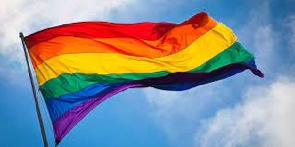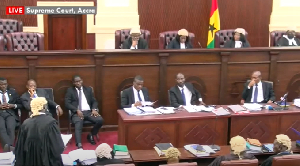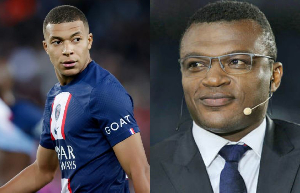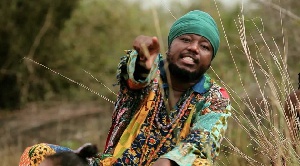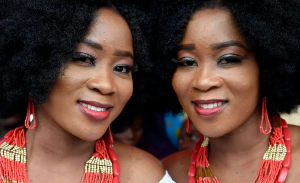Opinions of Wednesday, 19 April 2023
Columnist: Godfred W. Michaldo Atanga
LGBTQIA+ encroachment in Africa: A cultural neocolonialism
Despite not being a crime under international law, LGBTQ+ (aka homosexuality) is met with stiff resistance across Africa, Asia, Russia and Poland. According to a study carried out by Jeannine Gramick (2023), homosexuals are either imprisoned or put to death in about 70 nations of the world today.
And although pro-LGBTQ+ activists perceive the religious establishment as
their main persecutor, the outright abhorrence of the act in Africa has very little to do with religion and everything to do with the deep-seated cultural identity of the African. Thus, the prejudicial hate and feeling of disgust that Africans have for homosexuality and homosexuals respectively is inseparable from who the African truly is.
And even though equality groups are attempting to smuggle the rights of LGBTQ+ equality into the UN SDG Goal 5 (Gender equality’s) “leave no one behind” principle (which is specific to women and girls rights), Africa sees any such UN declaration in support of the rights of LGBTQ+ as an afterthought, a tool meant to pile undue pressure on countries who do not endorse it to accept it; like the apocalyptic mark of the beast (666) mentioned in Rev 13:18 of the Bible, no one can buy or sell without
accepting it (Rev 13:17).
None of the 9 targets of SDG Goal 5 mentions anything about LGBTQ+ rights. Africa signed equality for women and girls, not for homosexuals; and as such, any attempt by the West to hoodwink the rest of the world is at best a blot on the international framework of human rights, and an encroachment beyond the acceptable limits of Western boundaries. Such declarations seeking to tie LGBTQ+ uncontrolled human sexual proclivities with democratic values (that have to be upheld as basic human rights) have precarious consequences, including a possible
legitimization of deplorable sexual offenses such as pedophilia (which doubles as a DSM-5 psychiatric disorder treatable through long-term psychotherapy and drugs).
Attempts by Western government officials to condition foreign aid, external debt treatment requests and investments on a poor country’s disposition towards LGBTQ+ rights have raised serious concerns for Africans who see such conditionalities as a threat to their very cultural identity and sovereignty. This then begs the question, is the West justified by imposing such a thing as legitimizing LGBTQ+ on Africans despite deliberations about domestication of
development?
According to Michael Paul Todaro (1981), development is both a static and dynamic process of improvement and changes required for better living and existence. He defined “development” as a process of improving the quality of all human lives. For there to be development, Todaro (1981) postulates three things that must all be in full force:
Raising people’s living standards (i.e. income levels, consumption, food, medicine, education, security, etc.)
Creating an enabling environment for the self-esteem and dignity of people to grow (through the establishment of strong social, economic, political institutions)
Increase the choice basket of individuals and their freedom to choose what they need and want.
How do we increase the freedom of choice of people without compromising self-esteem and dignity (which are both functions of cultural identity) of the same human person? The definition for development is constantly changing to deal with some of these ambiguities and short falls:
What was considered “development” yesterday may not be considered a developmental issue today, because the needs of today may vary from that of yesterday: For instance, between the 1940s and 1950s, the Keynesian theory of economic growth was the dominant concept of development globally. By the 1960s, modernization theories propounded by the Marxists (of eradicating private property as solution to world conflicts, exploitation and inequalities) and the
Capitalists’ school of thought (of promoting democracy and private property rights) held way (Todaro, 1981).
Also, by the 1970s, the Dependency Theory of development (Socialism) overshadowed the previous national focus of the modernization theory in which rich nations impoverished underdeveloped nations through colonialism, and proposed socialism as the best means to development. The 1980 generation held the Globalization view which saw international trade as the surest bet to development and wealth of nations. Then came the idea of sustainable
development in 1987 (UN-WCED) which factored “care for the environment” into the old equation of development (Keeble, 1988).
Finally, the world entered the climate of the 1990s with a renewed understanding that development cannot be achieved without considering the social, cultural, economic, political, administrative and religious dimensions of development. Simply put, right from the days following Adam Smith’s “wealth of nations” up until the emergence of the Bretton Wood Institutions [i.e. Word Bank and International Monetary Fund (IMF)], development was theorized principally around economic growth.
The critics of such development theories say that such theories widened the inequality gap by making rich countries richer and poor countries poorer. The 21st century concept of development clearly states that the rich cannot lift the poor out of poverty. And despite the Millennium Development Goals (MDGs) of the year 2000 being replaced with the Sustainable Development Goals of 2015 to serve as global blueprint for world economies, Muller and Graves (2017) and other development theorists argue that there is the need for individual countries to address their own problems using their own ideas, and not rely on external ideas which may be ill-suited for their local context.
A country like Ghana instituted country-specific national development policy frameworks such as the GPRS I & II and GSGDA to adapt exogenous policy models to local conditions and discourses (Alasuutari, 2009).
Such policy domestication framework must of necessity include decisions on the suitability of LGBTQ+ acculturation, which to the people of Africa falls within the purview of sociocultural anthropology and relativism. Unity does not mean uniformity. Western culture must remain western and southern culture, southern; humankind can co-exist in brotherliness and still be diverse in race, religion, culture and national interests.
Any backward culture that no longer serves the interest of the 21st century must surely be obliterated into complete oblivion. But penalizing a sovereign country that insists on having boundaries for rational human sexual behavior is recipe for social contradictions that can have deleterious effects on the partnerships
for the UN Sustainable Development Goals. Nevertheless, Africa must take a cue from Michael Bassey Johnson’s adage to disentangle themselves from this imported cultural dilemma, “If you truly want to be respected by people you love, you must prove to them that you can survive without them.”

